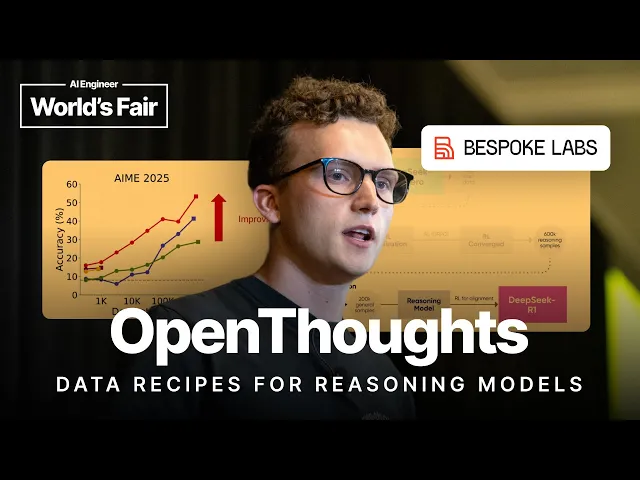OpenThoughts: Data Recipes for Reasoning Models — Ryan Marten, Bespoke Labs

Data recipes shape how AI models think
In the rapidly evolving landscape of AI development, researchers are discovering that the way we prepare data fundamentally shapes how models reason. Ryan Marten from Bespoke Labs recently shared fascinating insights on this topic in his presentation "OpenThoughts: Data Recipes for Reasoning Models." The talk reveals how seemingly minor changes in data preparation can dramatically alter an AI model's ability to think clearly and solve problems effectively.
Key insights from the presentation
-
Data recipes directly influence reasoning abilities – Different approaches to preparing training data create vastly different reasoning capabilities, even when using identical model architectures. The way information is structured and presented to models during training becomes embedded in how they think.
-
Chain-of-thought techniques produce remarkable improvements – By training models on examples that include step-by-step reasoning processes, researchers have achieved significant gains in problem-solving capabilities. This approach helps models break down complex questions rather than attempting to generate answers in a single step.
-
"Thoughts" as an abstraction layer bring flexibility** – Treating model reasoning as a separate layer from final outputs allows for more sophisticated problem-solving. Models can explore multiple reasoning paths and evaluate them before committing to an answer.
The paradigm shift in AI training
The most compelling insight from Marten's presentation is how the relationship between data and model performance fundamentally challenges our understanding of AI development. Traditional approaches focused heavily on model architecture and size, but this research suggests that carefully crafted data recipes may be equally or more important for creating genuinely intelligent systems.
This matters tremendously for the industry because it democratizes AI advancement. While only a handful of organizations have the resources to build the largest foundation models, data recipe innovation is accessible to a much wider range of researchers and companies. A mid-sized team with creative approaches to data preparation might achieve capabilities that rival those from organizations with vastly greater computational resources.
Beyond the presentation: Wider implications
What makes these findings particularly significant is how they parallel human learning. Humans develop critical thinking skills not just by absorbing information, but by seeing demonstrations of good reasoning processes. When students are shown how to think through problems step-by-step, they internalize these approaches and develop stronger analytical skills. AI models appear to benefit from a similar pedagogical approach.
This research also suggests promising directions for specialized domain applications.
Recent Videos
How To Earn MONEY With Images (No Bullsh*t)
Smart earnings from your image collection In today's digital economy, passive income streams have become increasingly accessible to creators with various skill sets. A recent YouTube video cuts through the hype to explore legitimate ways photographers, designers, and even casual smartphone users can monetize their image collections. The strategies outlined don't rely on unrealistic promises or complicated schemes—instead, they focus on established marketplaces with proven revenue potential for image creators. Key Points Stock photography platforms like Shutterstock, Adobe Stock, and Getty Images remain viable income sources when you understand their specific requirements and optimize your submissions accordingly. Specialized marketplaces focusing...
Oct 3, 2025New SHAPE SHIFTING AI Robot Is Freaking People Out
Liquid robots will change everything In the quiet labs of Carnegie Mellon University, scientists have created something that feels plucked from science fiction—a magnetic slime robot that can transform between liquid and solid states, slipping through tight spaces before reassembling on the other side. This technology, showcased in a recent YouTube video, represents a significant leap beyond traditional robotics into a realm where machines mimic not just animal movements, but their fundamental physical properties. While the internet might be buzzing with dystopian concerns about "shape-shifting terminators," the reality offers far more promising applications that could revolutionize medicine, rescue operations, and...
Oct 3, 2025How To Do Homeless AI Tiktok Trend (Tiktok Homeless AI Tutorial)
AI homeless trend raises ethical concerns In an era where social media trends evolve faster than we can comprehend them, TikTok's "homeless AI" trend has sparked both creative engagement and serious ethical questions. The trend, which involves using AI to transform ordinary photos into images depicting homelessness, has rapidly gained traction across the platform, with creators eagerly jumping on board to showcase their digital transformations. While the technical process is relatively straightforward, the implications of digitally "becoming homeless" for entertainment deserve careful consideration. The video tutorial provides a step-by-step guide on creating these AI-generated images, explaining how users can transform...
